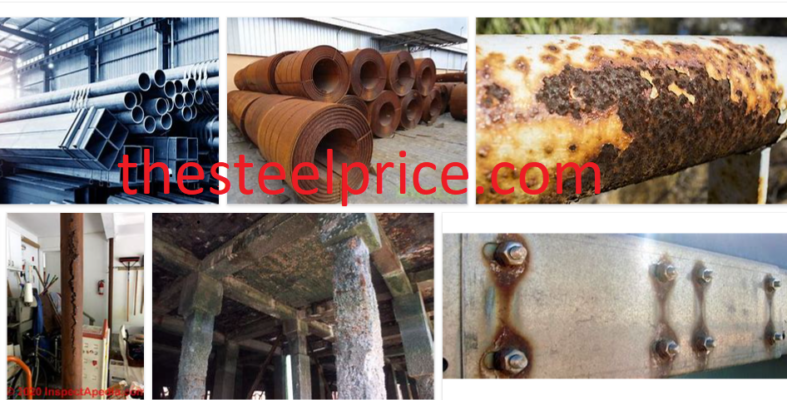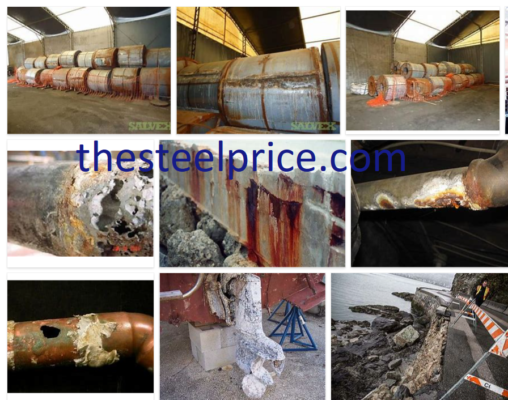Does sea water damage steel?
Seawater alone will not permanently harm steel, although other elements might cause or aggravate the steel’s condition. Rust and corrosion may build on steel more quickly than normal as a result of these damaging conditions.
Everything from offshore drilling sites to ocean liners is powered by steel ships. Does sea water damage steel? The fact that steel is totally resistant to sea water corrosion could surprise you!
Steel rusts more quickly than usual when exposed to salt water, as is widely known. How long will she be able to remain in the water?
All across the globe, seas, rivers, and lakes are excellent sources of drinking water. We wouldn’t be here without water. Does sea water damage steel? It’s useful for both making things and living with them. Water’s function as a solvent is well-known. Water, on the other hand, cannot entirely dissolve steel. Yes, extended exposure to sea water may cause steel to deteriorate…
Rust may occur in steel if chemicals found in seawater are introduced to the material. Does sea water damage steel? Damage may be done permanently by rust, which corrodes the steel further.
Steel is widely believed to rust if exposed to saltwater for an extended period of time. When salt water comes into touch with steel, it develops a coating of rust as a protective barrier. Corrosion products such as rust are not the cause of corrosion. Does sea water damage steel? You may thank dissolved oxygen and redox processes for this. As a result, when storing wet metal equipment, allow it to come to ambient temperature.
Steel, like other metals, rusts when exposed to oxygen. Corrosion of steel occurs as a result of chemical reactions in seawater involving oxygen and other elements. Because of the dissolved oxygen, debris, and seaweed in shipyard water, the process is expedited.
Steel may corrode in only a few hours when submerged in salt water. Even in fresh water with a salt level of 2% by weight, the steel will corrode. The sodium concentration in seawater may reach 35%. Steel objects, especially ships, may take a beating under these circumstances.
Steel may be corroded by seawater that penetrates its pores.
The solution to this question is everything but straightforward. Generally speaking, it may not be as horrible as you initially assume. I’ll do my best to provide a straightforward response to your question while also including some sound advice from the metallurgical community.
Does sea water damage steel?
When metal reacts with oxygen in the air, it produces an iron oxide-based compound known as rust (aka: Rust). Oxidation is the name given to this process. Oxygen is required for it to occur.
Is steel harmed by seawater? No, the steel is not normally harmed on a microscopic level by this process. Larger structures, on the other hand, are more vulnerable to salt corrosion’s ravaging effects.
The issue “can sea water harm stainless steel?” came up recently in a discussion on the use of steel in saltwater areas. No, steel is not harmed by exposure to the ocean. We’ll investigate the reasons behind this, as well as any confounding factors.

As a result, seawater is saline. It’s sour as hell. Our knowledge of the saltiest material on Earth is limited to magnesium chloride, a compound used in toothpaste and as an industrial solvent. We believe the added weight is what’s causing the rusting shipwrecks to crumble apart. However, what if steel items are left in the water for an extended period of time? Are they going to be smashed up at some point? Probably not, but it’s possible. For starters, whereas steel rusts very fast when exposed to air, saltwater, which already contains rusting products from other metals, has a relatively low corrosion rate for steel. As time goes on, sand and other sediments will build up on rusted items that are at or near the water’s surface. The Does sea water damage steel? sediments will shield the steel’s interior layers from further corrosion by forming a barrier to fresh water and other corrosive substances that will never be able to reach the sediments themselves.
Steel may be damaged by sea salt water. When exposed to steel for an extended length of time, it is very corrosive and damages the metal.
Even fresh steel may be corroded by seawater. Here are a few ways to extend the life of the device.
There is a steady change in the geographical organization of sea water since it is a natural element. Since the chloride and magnesium ions in sea water are so corrosive, they give sea water its salty taste. Does sea water damage steel? Despite the fact that seawater has fewer impurities than freshwater, the absence of oxygen means that it is still not clean water. Under harsh circumstances, zinc or rubber-coated steel will withstand corrosion for a short amount of time, but its life expectancy is significantly reduced.
The presence of dissolved salts in seawater is well-documented. Because salt has a large electrolytic potential, it has corrosive effects on steel.
What happens if steel stays in the sea?
Marine grade steel is the kind of steel used in ships. As the name suggests, “Marine Grade” is a designation for steel that can tolerate saline seawater and impact.
Since the dawn of commercial shipping, seawater corrosion of ship hulls has been an issue. Numerous ship-environment interactions may cause considerable damage and ultimate ship failure if left uncontrolled.
Steel is an extremely long-lasting material. Seawater and salt air may erode it, but it is still a robust metal.
Everything from the millions of small droplets created by wave action to salt water oceans is included by the phrase sea water. Seawater is always salty because of the dissolved minerals and salts that give it the name “brine” or “salt” that humans have given it. Because of the greater concentration of salt in saltwater, it is denser than freshwater.
Iron and carbon make up steel, which may also be used to manufacture castings of steel, although in most circumstances it refers to a completed product, i.e, stee.n

